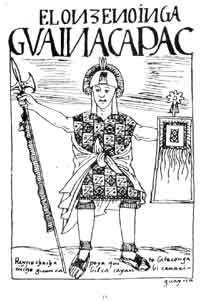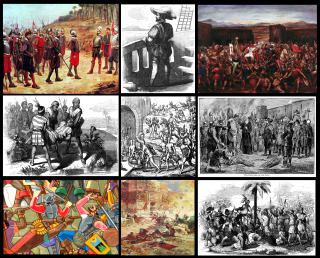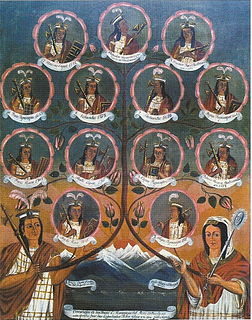
Ecuador, officially the Republic of Ecuador, is a country in northwestern South America, bordered by Colombia on the north, Peru on the east and south, and the Pacific Ocean on the west. Ecuador also includes the Galápagos Islands in the Pacific, about 1,000 kilometres (621 mi) west of the mainland. The capital is Quito.

Francisco Pizarro González was a Spanish conquistador, best known for his expeditions that led to the Spanish conquest of Peru.

Atahualpa, Atawallpa (Quechua), also Atabalica, Atahuallpa, Atabalipa (c. 1502–26 July 1533) was the last Inca Emperor. After defeating his brother, Atahualpa became very briefly the last Sapa Inca of the Inca Empire (Tawantinsuyu) before the Spanish conquest ended his reign.

Huayna Capac (1464/1468–1524) was the third Sapan Inka of the Inca Empire, born in Tumipampa sixth of the Hanan dynasty, and eleventh of the Inca civilization. As other Sapa Inkas, Huayna Capac subjects commonly approached him adding epithets and titles when addressing him, commonly as Wayna Qhapaq Inka Sapa'lla Tukuy Llaqt'a Uya "Unique Sovereign Wayna Qhapaq Listener of All Peoples". His original name was Titu Kusi Wallpa. He was the successor to Tupaq Inka Yupanki.

The Ecuador national football team has represented Ecuador in men's international football since 1938 and is controlled by the Ecuadorian Football Federation. They joined FIFA in 1926 and CONMEBOL a year later.

The 1993 Copa América was the 36th Copa América, CONMEBOL's football tournament for national teams. It was held in Ecuador between June 15 and July 4. All 10 CONMEBOL members took part, but for the first time two nations from outside CONMEBOL were invited to take part in the tournament, to round out the format. Mexico and the United States, both of CONCACAF, were the invited teams for this tournament. Argentina defeated Mexico in the final 2–1 to win their record 14th continental championship.

The Spanish conquest of the Inca Empire, also known as the Conquest of Peru, was one of the most important campaigns in the Spanish colonization of the Americas. After years of preliminary exploration and military skirmishes, 168 Spanish soldiers under conquistador Francisco Pizarro, his brothers, and their native allies captured the Sapa Inca Atahualpa in the 1532 Battle of Cajamarca. It was the first step in a long campaign that took decades of fighting but ended in Spanish victory in 1572 and colonization of the region as the Viceroyalty of Peru. The conquest of the Inca Empire, led to spin-off campaigns into present-day Chile and Colombia, as well as expeditions towards the Amazon Basin.

Rumiñahuii, born late 15th century, died June 25, 1535, was a general during the civil war, who after the death of Emperor Atahualpa, led the resistance against the Spanish in the northern part of the Inca Empire in 1533.

The Incas were most notable for establishing the Inca Empire in pre-Columbian America, which was centered in what is now Peru from 1438 to 1533, and represented the height of the Inca civilization. The Inca state was known as the Kingdom of Cuzco before 1438. Over the course of the Inca Empire, the Inca used conquest and peaceful assimilation to incorporate the territory of modern-day Peru, followed by a large portion of western South America, into their empire, centered on the Andean mountain range. However, shortly after the Inca Civil War, the last Sapa Inca (emperor) of the Inca Empire was captured and killed on the orders of the conquistador Francisco Pizarro, marking the beginning of Spanish rule. The remnants of the empire retreated to the remote jungles of Vilcabamba and established the small Neo-Inca State, which was conquered by the Spanish in 1572.
The Battle of Quipaipán was the decisive battle of the Inca Civil War between the brothers Atahualpa and Huáscar. After the victory at Chimborazo, Atahualpa stopped in Cajamarca as his generals followed Huáscar to the south. The second confrontation took place at Quipaipán, where Huáscar was again defeated, his army disbanded, Huáscar himself captured and - save for the intervention of Pizarro - the entire Inca empire nearly fallen to Atahualpa.
Rumiñawi, born late 15th century in present-day Ecuador, died June 25, 1535, was a general during the Inca Civil War. After the death of Emperor Atahualpa, he led the resistance in 1533 against the Spanish in the northern part of the Inca Empire. According to tradition, he ordered the city's treasure to be hidden and the city burned to prevent looting by the Spaniards. Although captured and tortured, he never revealed the treasure. Since 1985, December 1 is celebrated as a day of commemoration of his acts.

Paracetopsis is a genus of whale catfishes found in tropical South America.
The 1993 season is the 71st season of competitive football in Ecuador.
The 2004 season is the 82nd season of competitive football in Ecuador.
The 2001 season was the 79th season of competitive football in Ecuador.
The South American Zone of 2014 FIFA World Cup qualification saw nine teams competing for 4 or 5 berths in the finals. Brazil automatically qualified for the World Cup as the host nation so were not involved in CONMEBOL qualifying. Argentina, Colombia, Chile, Ecuador and Uruguay advanced to the World Cup.
The 2011 South American Under-17 Football Championship was the 14th U-17 tournament for national teams affiliated with CONMEBOL. It was held in Ecuador from 12 March to 9 April 2011.

The 2017 South American Youth Football Championship Spanish: Campeonato Sudamericano Sub-20 Juventud de América Ecuador 2017, Portuguese: Campeonato Sul-Americano Sub-20 Juventude da América Ecuador 2017) was the 28th edition of the South American Youth Football Championship, a football competition for the under-20 national teams in South America organized by CONMEBOL. It was held in Ecuador from 18 January to 11 February 2017.

The Inca-Caranqui archaeological site is located in the village of Caranqui on the southern outskirts of the city of Ibarra, Ecuador. The ruin is located in a fertile valley at an elevation of 2,299 metres (7,543 ft). The region around Caranqui, extending into the present day country of Colombia, was the northernmost outpost of the Inca Empire and the last to be added to the empire before the Spanish conquest of 1533. The archaeological region is also called the Pais Caranqui.

The 2019 Copa CONMEBOL Libertadores Femenina was the 11th edition of the CONMEBOL Libertadores Femenina, South America's premier women's club football tournament organized by CONMEBOL. The tournament was held in Quito, Ecuador from 11 to 28 October 2019.












